Intermarkets' Privacy Policy
Support
Donate to Ace of Spades HQ!
Contact
Ace:aceofspadeshq at gee mail.com
Buck:
buck.throckmorton at protonmail.com
CBD:
cbd at cutjibnewsletter.com
joe mannix:
mannix2024 at proton.me
MisHum:
petmorons at gee mail.com
J.J. Sefton:
sefton at cutjibnewsletter.com
Recent Entries
Daily Tech News 22 February 2026
Saturday Night Club ONT - February 21, 2026 [2 D's]
Nobody Does It Better? James Bond on Netflix [Lex]
Hobby Thread - February 21, 2026 [TRex]
Ace of Spades Pet Thread, February 21
Gardening, Home and Nature Thread, Feb. 21
When will the left show us what "The Right Side of History" should look like?
The Classical Saturday Morning Coffee Break & Prayer Revival
Daily Tech News 21 February 2026
A Meme Is A Terrible Thing To Waste
Saturday Night Club ONT - February 21, 2026 [2 D's]
Nobody Does It Better? James Bond on Netflix [Lex]
Hobby Thread - February 21, 2026 [TRex]
Ace of Spades Pet Thread, February 21
Gardening, Home and Nature Thread, Feb. 21
When will the left show us what "The Right Side of History" should look like?
The Classical Saturday Morning Coffee Break & Prayer Revival
Daily Tech News 21 February 2026
A Meme Is A Terrible Thing To Waste
Absent Friends
Jay Guevara 2025
Jim Sunk New Dawn 2025
Jewells45 2025
Bandersnatch 2024
GnuBreed 2024
Captain Hate 2023
moon_over_vermont 2023
westminsterdogshow 2023
Ann Wilson(Empire1) 2022
Dave In Texas 2022
Jesse in D.C. 2022
OregonMuse 2022
redc1c4 2021
Tami 2021
Chavez the Hugo 2020
Ibguy 2020
Rickl 2019
Joffen 2014
Jim Sunk New Dawn 2025
Jewells45 2025
Bandersnatch 2024
GnuBreed 2024
Captain Hate 2023
moon_over_vermont 2023
westminsterdogshow 2023
Ann Wilson(Empire1) 2022
Dave In Texas 2022
Jesse in D.C. 2022
OregonMuse 2022
redc1c4 2021
Tami 2021
Chavez the Hugo 2020
Ibguy 2020
Rickl 2019
Joffen 2014
AoSHQ Writers Group
A site for members of the Horde to post their stories seeking beta readers, editing help, brainstorming, and story ideas. Also to share links to potential publishing outlets, writing help sites, and videos posting tips to get published.
Contact OrangeEnt for info:
maildrop62 at proton dot me
maildrop62 at proton dot me
Cutting The Cord And Email Security
Moron Meet-Ups
« Saturday Afternoon Chess thread 08-08-2020 |
Main
| Saturday Overnight Open Thread (8/8/20) »
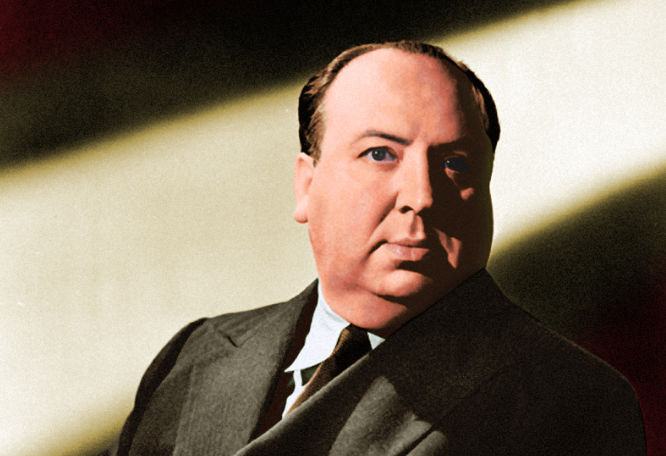
I've gone through all of Alfred Hitchcock's filmography, and I can easily say that the man made a lot of movies over a long period of time. From the mid 20s to the late 70s, he has directing credits on fifty-three feature films that still exist. That's a lot of ground to cover, and it's far too much ground to cover in a single Saturday Evening Movie Thread. I may or may not follow this up with other Hitchcock threads, but for tonight I'm going to focus on a single period in the man's illustrious career.
Hitchcock started his career in the movies as a title designer before being promoted to director with The Pleasure Garden in 1925 (which I actually wrote about a while ago here). He was a contract director in the British film industry at Elstree Studios, and he took whatever assignment the studio handed him. He was well on his way to developing a cohesive cinematic signature by 1929 as he was directing the feature film Blackmail when sound suddenly became a big thing and threw every film industry in the world into upheaval. Eager to capture the zeitgeist, the studio mandated that the already completed Blackmail should become a silent/talkie hybrid, and it took several years and several feature films for Hitchcock to regain his assured cinematic hand.
This period fascinates me mostly because it's a wonderful microcosm of the tumult in the film industry as a whole. It's a wonderful vehicle to talk about the overall transition into sound pictures.
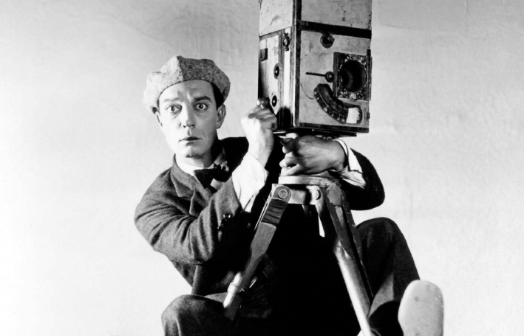
When cinema became a medium in the final years 19th century, almost no one looked at the silent black and white moving images and felt like that was as far as the medium would go. They wanted both sound and color back then, but the technologies for either simply did not exist at the time. So, as inventors fiddled with how to match sound and image, the movies were born and they flourished for thirty years.
In those thirty years, the movies went from cameras on tripods capturing action on a set the size of a theater stage like in The Great Train Robbery:
To wildly inventive forms of visual language as evidenced by people such as Carl Theodore Dreyer and his film The Passion of Joan of Arc:
And Sergei Eisenstein in the new Soviet Union and his movie Battleship Potemkin:
At the same time, people like Lee de Forest were taking the sound to film problem seriously. The first and most obvious solution was trying to use phonographs to record and playback sound, but synching became impossible on playback. In addition, films often lost frames over time as projectionists clipped films for a variety of reasons, making the phonograph a complete impossibility to use for the long term. Sound needed to be captured on the film itself, and de Forest, along with men like Freeman Owens, used light to capture sound information directly onto the film in a system called variable density, which became Phonofilm and the default sound system for early film. There were problems, though.
The Jazz Singer Changes Hollywood
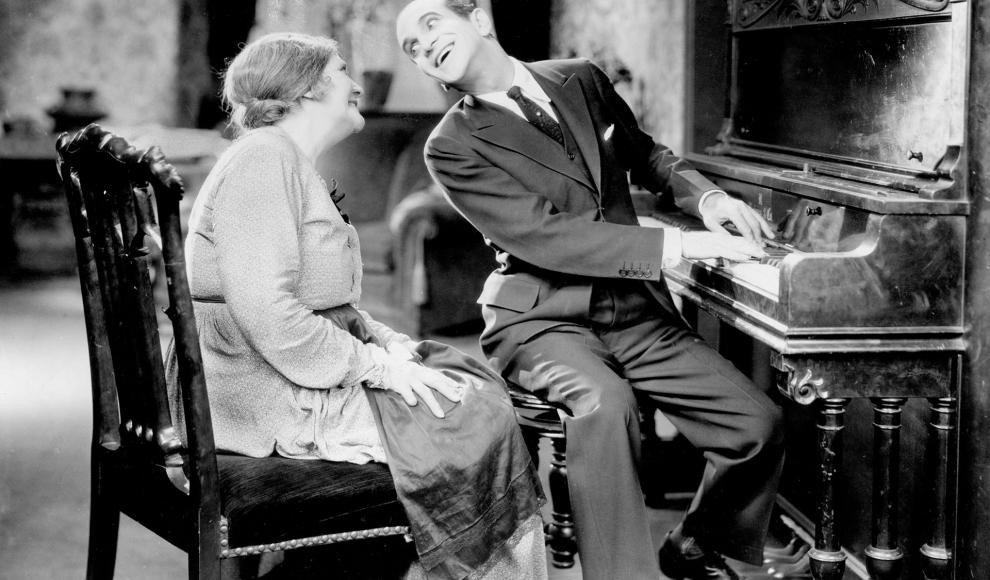
Al Jolson's The Jazz Singer was not the first sound film ever made, but it was the feature film that convinced Hollywood that sound on film was a viable commercial product. It was wildly successful financially and the film industry did what it does best: it copied.
In the middle of this was a workmanlike director in the United Kingdom named Alfred Hitchcock. He was on the tail end of filming his newest feature titled Blackmail for British International Pictures, and orders came that they needed to change the movie to sound. The film was completed (and was, in fact released silently to the vast majority of theaters that did not have the ability to play back sound), but new material needed to be shot in order to become a talkie.
And that's why Blackmail becomes so interesting from a historical perspective. Not only was it the first British talkie, but it demonstrates both the near cluelessness that early talkie filmmakers approached the use of sound as well as showing how Alfred Hitchcock quickly adapting to a new technology. In the silent sequences, the camera moves freely with interesting uses of shadows and motion to tell the story visually, but for all but one of the sound sequences, everything becomes nailed down and rather dull.
The central problem was that early cameras were rather loud machines and would easily pollute the soundtrack with extra noise. Editing sound was an incredibly difficult process in those early years, so everything needed to be caught along with the image with no dubbing later. The solution ended up being putting the camera in a literal box with a glass pane separating the camera lens from the action. As one early sound man described it, the glass made great lenses mediocre. The camera couldn't move, and, on top of it, the dialogue written wasn't necessary for the story since the story was designed to work without it. The extended dialogue sequences feel meandering and pointless, all while the actual quality of the sound ended up being rather poor because of the primitive technology at play.
The people loved the gimmick though, and Blackmail was a success, convincing British International Pictures to make more talkies. But what should they do now? It's not like they had screenwriters experienced in writing dialogue. So, they did just about the worst thing they could decide to do: The went to the theater.
Theater on Film
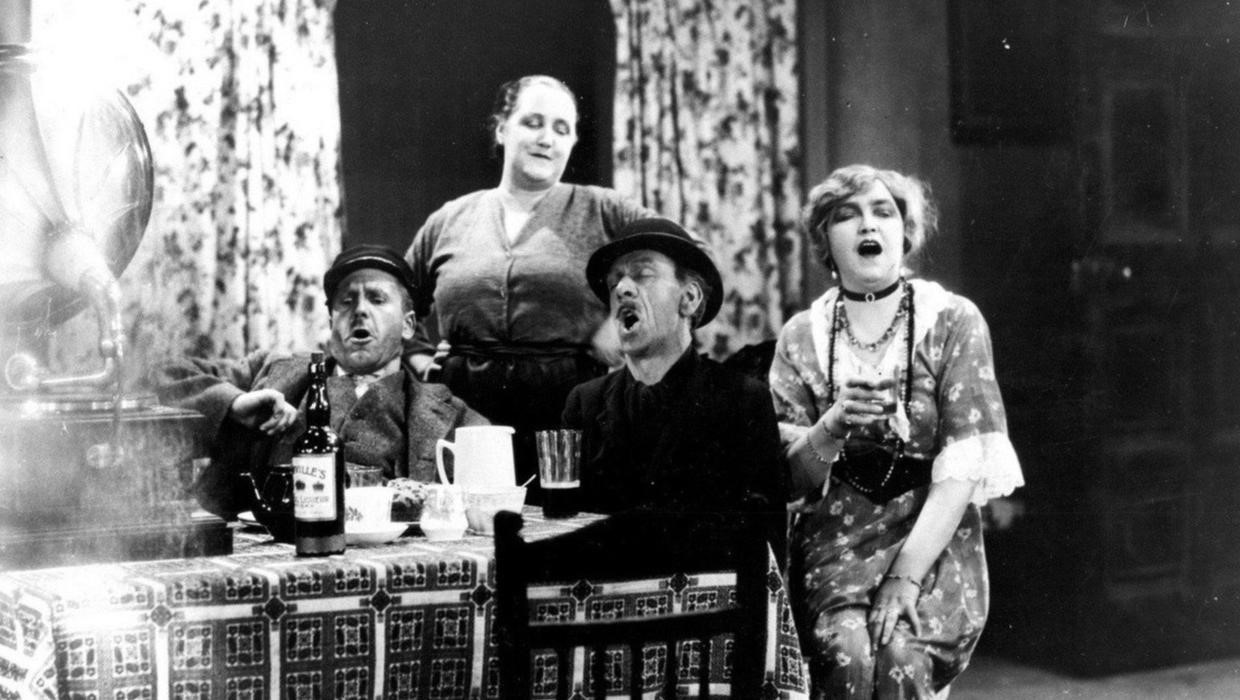
Theater and film share a lot of superficial characteristics. They both involve actors, dialogue, sets, costumes, and drama. However, the innate natures of both mediums are vastly different. The key is in how cinema uses the camera to focus the audience on individual things instead of letting the audience discover the entire stage of a theatrical production, and the use of editing. Plays need to be adapted to the cinematic medium in order to work, to account for the changes in how the two convey human emotions to the audience, but early talkie filmmakers either didn't understand that just yet or they simply were moving too fast to really think about it. Hitchcock got caught up in this move just like the rest, and his next picture was a filmed production of the Irish play Juno and the Paycock.
I imagine the play works better on the stage, but in film, Hitchcock's "adaptation" is flat and rather dull. There's almost nothing remotely cinematic about the experience and it represents the ultimate cash grab by a studio. They knew they needed to get sound pictures out, so they grabbed a play and filmed it. The technical limitations still applied, so the camera is static throughout most of it, only going into the occasional zoom to differentiate itself.
It wasn't until his next movies that Hitchcock began to feel more comfortable in the medium with the new rules.
Advancements
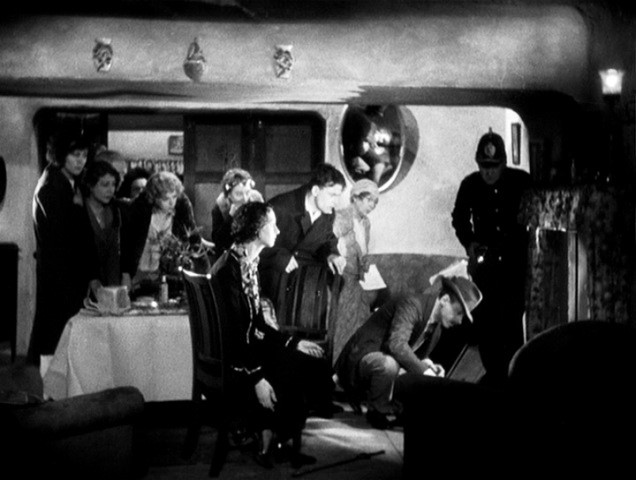
When looking back at the transition from silent to sound, it's easy to sit here ninety years later and scoff at the dullards who imagined that sound would never take hold. But, learning more about how film worked and the technical limitations of capturing sound at the time, it becomes clear why filmmakers would be dismissive of the new technology. Everything that made film film to those who actually made films was in the camera. The ability to move, to tell things visually, to tell them well with great lenses all with a style of acting that had taken hold and allowed for actual subtly in performance was all being tossed aside so that audiences could hear characters say inane things that didn't advance the story. Films came to screeching halts with sound and the unique visual feel of the cinema got completely lost when sound equipment came on stage. The early naysayers of sound missed two things, though. The first was the simple mass appeal of hearing people talk. The other was that sound equipment was going to get better.
An interesting thing about this point in Hitchcock's career as sound technology crept forward is that he made the same movie twice at the same time. The first was for English audiences and the movie was titled Murder! while the second was for German audiences and was titled Mary. They are literally the same movie shot for shot (save some minor changes here and there) but with English versus German actors. What's important in terms of this discussion is that Hitchcock was finally able to move his camera again.
There's a scene early where a woman, who was an acquaintance of a murdered actress, tries to get some information from the owner of the small hotel where they were staying about the murder. The scene moves from a small dining nook to the kitchen and back, and it's all done in a single take. It tracks them from one room to the next and back again several times all while the characters were talking back and forth about the murdered woman and the woman accused of doing the murdering. It shows how far the technology had already come in just a couple of years. Hitchcock could move his camera again.
It's also a window into a studio technique of how to appeal to foreign markets. In the silent era, they could take film from any country and change the intertitles to match the language of the local market. It was pretty easy, but suddenly with people talking, you couldn't just send an English movie to Germany. What do you do? Well, the modern solution is subtitles or dubbing, but some studios at the time decided that it was best to send completely localized versions to those markets. The most famous example is the Spanish version of Universal's Dracula that used a different cast and crew but the same sets and filmed at night after the American cast and crew had left. Mary was just Hitchcock's contribution to that funny little practice.
However, there was still a lot of unknowns about effective dialogue. The film, in both versions, has an extended jury deliberation where the characters talk for an unnaturally long period of time about different theories of fugue states that ends up having nothing to do with the story at hand. It feels more like a way to have a dialogue scene rather than anything to advance the story. There was still work to be done. It wasn't until The Skin Game when Hitchcock even began to feel overall comfortable with the new tools at his disposal.
From Hindrance to Asset
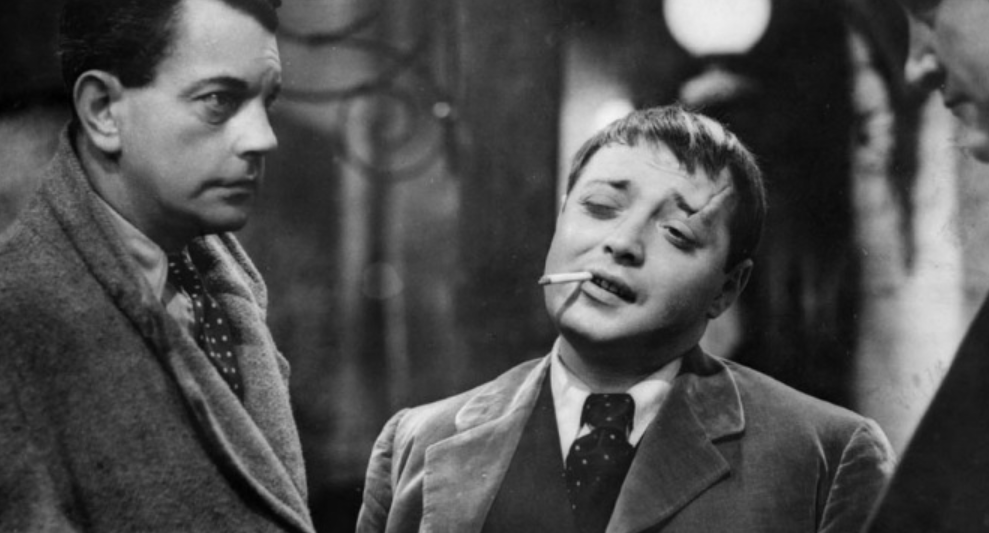
From 1931 through 1934, Hitchcock made five movies. The Skin Game was another adaptation of a play, though it feels far more cinematic with better performances than Juno and the Paycock. East of Shanghai is a drama about a married couple on an extended vacation who grow apart and come back together again, and it feels rather natural as a sound picture, though as drama there's not a whole lot of interesting things to the sound design. Number 17 would be a classic Hitchcock thriller if it were about thirty minutes longer, and it suffers because of the struggle to film a more action-oriented story with early sound tools. Strauss' Great Waltz is a comedy of limited amusements centered around music and allows for some interesting little jokes based on sound, but the sound design is very limited, allowing only some use of some basic tools to make them work.
It's The Man Who Knew Too Much, the movie that Hitchcock would later remake in the 50s with Doris Day and Jimmy Stewart, where Hitchcock finally feels at home in this new sound world. There's still some roughness to the sound design, especially around the opening skiing sequence, but it finally feels like Hitchcock isn't being held back by sound anymore. This was the first time since the silent version of Blackmail where it feels like Alfred Hitchcock was in full control of the technical aspects of filmmaking. It just took five years of pounding out other movies for him to regain his feet. He finally regained the cinematic language he had lost with the advent of sound. He could do chases, shootouts, even a big climax at Albert Hall centered around a specific piece of music and it all felt like a natural part of the story.
Singin' in the Rain
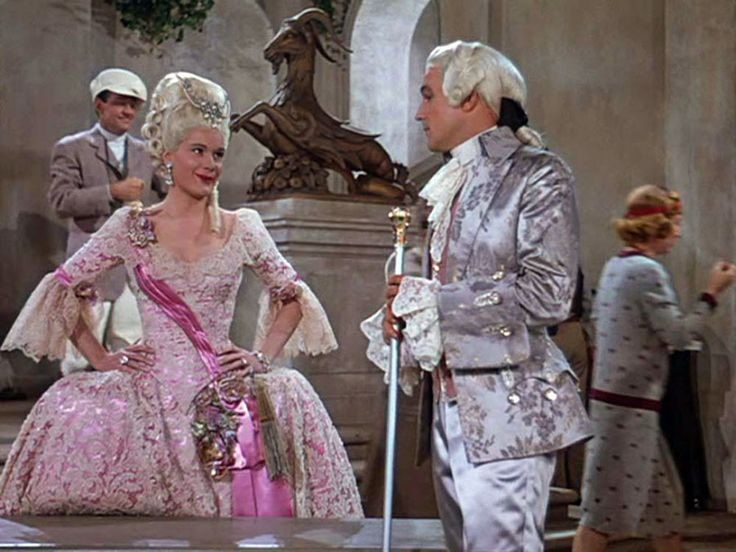
Of course, you can get a similar, concentrated, and fictionalized telling of the troubles of the early sound era by simply watching the Gene Kelly movie Singin' in the Rain. It's the musical, American version of some of what Hitchcock went through in converting Blackmail into sound.
From the placement of microphones:
To the fact that the main star did not sound the way audiences expected in much the same way as Blackmail's female lead, Anny Ondra, was Czech and spoke English with a heavy accent so she was dubbed over by Joan Barry on set as Ondra lip synched her lines:
The film captures a lot of what studios had to go through to latch onto the new sound frontier.
Movies of Today
Opening in Theaters:
Nothin'. There's a virus, dontcha know.
Next in my Netflix Queue:
A Man Escaped
Movies I Saw This Fortnight:
Vertigo (Rating 4/4) Full Review "The movie actually gets better on rewatches because the characters are so well built that while Scottie is going through his end of the mystery that we already know, he's not just following breadcrumbs. He's building an ideal that carries him through the film to the end." [Personal Collection]
Topaz (Rating 1.5/4) Full Review "It's an overlong, uninvolving mess of a film. It's several stories that happen to involve some of the same characters squished together. It's a drag, but at least it looks pretty good." [Personal Collection]
North by Northwest (Rating 4/4) Full Review "It's bright and colorful and the most purely fun movie Hitchcock had made since The 39 Steps." [Personal Collection]
The Wrong Man (Rating 4/4) Full Review "The Wrong Man is a different film for Hitchcock, embracing certain aesthetics and narrative conventions that he hadn't touched before while embracing a burgeoning set of cinematic techniques originating from France and Italy (as opposed to the early German influences on his visual style). It's a great film." [Personal Collection]
Rear Window (Rating 4/4) Full Review "However, more importantly, it's a crackling great thriller with great characters, an intriguing central mystery, and some of the best sequences of pure tension that Hitchcock ever produced in one of his best movies." [Personal Collection]
Dial M for Murder (Rating 3.5/4) Full Review " It's a highly entertaining mystery that moves through its twists deftly and with charm. It's not Hitchcock's best, but, if he was as disengaged as the stories say, then it's probably his best work when he didn't care." [DailyMotion]
The Trouble with Harry (Rating 3.5/4) Full Review "While I can understand why many modern audiences wouldn't share my enthusiasm for The Trouble with Harry considering its slow pace and gentle sense of humor, I find the combination rather infectious. It's a delightful movie that straddles a combination of tones rather deftly. [Personal Collection]
Psycho (Rating 4/4) Full Review "It's Hitchcock playing with the audience, twisting the knife into them about expectations, emotional investment, and denouements. He's playing the audience like a fiddle, and it works so incredibly well. It's experimental, cruel, and wildly effective." [Personal Collection]
Contact
Email any suggestions or questions to thejamesmadison.aos at symbol gmail dot com.
Follow me on Twitter.
I've also archived all the old posts here, by request. I'll add new posts a week after they originally post at the HQ.
August 08, 2020
Saturday Evening Movie Thread 08-08-2020 [TheJamesMadison]
Hitchcock, The Early Years

I've gone through all of Alfred Hitchcock's filmography, and I can easily say that the man made a lot of movies over a long period of time. From the mid 20s to the late 70s, he has directing credits on fifty-three feature films that still exist. That's a lot of ground to cover, and it's far too much ground to cover in a single Saturday Evening Movie Thread. I may or may not follow this up with other Hitchcock threads, but for tonight I'm going to focus on a single period in the man's illustrious career.
Hitchcock started his career in the movies as a title designer before being promoted to director with The Pleasure Garden in 1925 (which I actually wrote about a while ago here). He was a contract director in the British film industry at Elstree Studios, and he took whatever assignment the studio handed him. He was well on his way to developing a cohesive cinematic signature by 1929 as he was directing the feature film Blackmail when sound suddenly became a big thing and threw every film industry in the world into upheaval. Eager to capture the zeitgeist, the studio mandated that the already completed Blackmail should become a silent/talkie hybrid, and it took several years and several feature films for Hitchcock to regain his assured cinematic hand.
This period fascinates me mostly because it's a wonderful microcosm of the tumult in the film industry as a whole. It's a wonderful vehicle to talk about the overall transition into sound pictures.
Cinematic Language

When cinema became a medium in the final years 19th century, almost no one looked at the silent black and white moving images and felt like that was as far as the medium would go. They wanted both sound and color back then, but the technologies for either simply did not exist at the time. So, as inventors fiddled with how to match sound and image, the movies were born and they flourished for thirty years.
In those thirty years, the movies went from cameras on tripods capturing action on a set the size of a theater stage like in The Great Train Robbery:
To wildly inventive forms of visual language as evidenced by people such as Carl Theodore Dreyer and his film The Passion of Joan of Arc:
And Sergei Eisenstein in the new Soviet Union and his movie Battleship Potemkin:
At the same time, people like Lee de Forest were taking the sound to film problem seriously. The first and most obvious solution was trying to use phonographs to record and playback sound, but synching became impossible on playback. In addition, films often lost frames over time as projectionists clipped films for a variety of reasons, making the phonograph a complete impossibility to use for the long term. Sound needed to be captured on the film itself, and de Forest, along with men like Freeman Owens, used light to capture sound information directly onto the film in a system called variable density, which became Phonofilm and the default sound system for early film. There were problems, though.
The Jazz Singer Changes Hollywood

Al Jolson's The Jazz Singer was not the first sound film ever made, but it was the feature film that convinced Hollywood that sound on film was a viable commercial product. It was wildly successful financially and the film industry did what it does best: it copied.
In the middle of this was a workmanlike director in the United Kingdom named Alfred Hitchcock. He was on the tail end of filming his newest feature titled Blackmail for British International Pictures, and orders came that they needed to change the movie to sound. The film was completed (and was, in fact released silently to the vast majority of theaters that did not have the ability to play back sound), but new material needed to be shot in order to become a talkie.
And that's why Blackmail becomes so interesting from a historical perspective. Not only was it the first British talkie, but it demonstrates both the near cluelessness that early talkie filmmakers approached the use of sound as well as showing how Alfred Hitchcock quickly adapting to a new technology. In the silent sequences, the camera moves freely with interesting uses of shadows and motion to tell the story visually, but for all but one of the sound sequences, everything becomes nailed down and rather dull.
The central problem was that early cameras were rather loud machines and would easily pollute the soundtrack with extra noise. Editing sound was an incredibly difficult process in those early years, so everything needed to be caught along with the image with no dubbing later. The solution ended up being putting the camera in a literal box with a glass pane separating the camera lens from the action. As one early sound man described it, the glass made great lenses mediocre. The camera couldn't move, and, on top of it, the dialogue written wasn't necessary for the story since the story was designed to work without it. The extended dialogue sequences feel meandering and pointless, all while the actual quality of the sound ended up being rather poor because of the primitive technology at play.
The people loved the gimmick though, and Blackmail was a success, convincing British International Pictures to make more talkies. But what should they do now? It's not like they had screenwriters experienced in writing dialogue. So, they did just about the worst thing they could decide to do: The went to the theater.
Theater on Film

Theater and film share a lot of superficial characteristics. They both involve actors, dialogue, sets, costumes, and drama. However, the innate natures of both mediums are vastly different. The key is in how cinema uses the camera to focus the audience on individual things instead of letting the audience discover the entire stage of a theatrical production, and the use of editing. Plays need to be adapted to the cinematic medium in order to work, to account for the changes in how the two convey human emotions to the audience, but early talkie filmmakers either didn't understand that just yet or they simply were moving too fast to really think about it. Hitchcock got caught up in this move just like the rest, and his next picture was a filmed production of the Irish play Juno and the Paycock.
I imagine the play works better on the stage, but in film, Hitchcock's "adaptation" is flat and rather dull. There's almost nothing remotely cinematic about the experience and it represents the ultimate cash grab by a studio. They knew they needed to get sound pictures out, so they grabbed a play and filmed it. The technical limitations still applied, so the camera is static throughout most of it, only going into the occasional zoom to differentiate itself.
It wasn't until his next movies that Hitchcock began to feel more comfortable in the medium with the new rules.
Advancements

When looking back at the transition from silent to sound, it's easy to sit here ninety years later and scoff at the dullards who imagined that sound would never take hold. But, learning more about how film worked and the technical limitations of capturing sound at the time, it becomes clear why filmmakers would be dismissive of the new technology. Everything that made film film to those who actually made films was in the camera. The ability to move, to tell things visually, to tell them well with great lenses all with a style of acting that had taken hold and allowed for actual subtly in performance was all being tossed aside so that audiences could hear characters say inane things that didn't advance the story. Films came to screeching halts with sound and the unique visual feel of the cinema got completely lost when sound equipment came on stage. The early naysayers of sound missed two things, though. The first was the simple mass appeal of hearing people talk. The other was that sound equipment was going to get better.
An interesting thing about this point in Hitchcock's career as sound technology crept forward is that he made the same movie twice at the same time. The first was for English audiences and the movie was titled Murder! while the second was for German audiences and was titled Mary. They are literally the same movie shot for shot (save some minor changes here and there) but with English versus German actors. What's important in terms of this discussion is that Hitchcock was finally able to move his camera again.
There's a scene early where a woman, who was an acquaintance of a murdered actress, tries to get some information from the owner of the small hotel where they were staying about the murder. The scene moves from a small dining nook to the kitchen and back, and it's all done in a single take. It tracks them from one room to the next and back again several times all while the characters were talking back and forth about the murdered woman and the woman accused of doing the murdering. It shows how far the technology had already come in just a couple of years. Hitchcock could move his camera again.
It's also a window into a studio technique of how to appeal to foreign markets. In the silent era, they could take film from any country and change the intertitles to match the language of the local market. It was pretty easy, but suddenly with people talking, you couldn't just send an English movie to Germany. What do you do? Well, the modern solution is subtitles or dubbing, but some studios at the time decided that it was best to send completely localized versions to those markets. The most famous example is the Spanish version of Universal's Dracula that used a different cast and crew but the same sets and filmed at night after the American cast and crew had left. Mary was just Hitchcock's contribution to that funny little practice.
However, there was still a lot of unknowns about effective dialogue. The film, in both versions, has an extended jury deliberation where the characters talk for an unnaturally long period of time about different theories of fugue states that ends up having nothing to do with the story at hand. It feels more like a way to have a dialogue scene rather than anything to advance the story. There was still work to be done. It wasn't until The Skin Game when Hitchcock even began to feel overall comfortable with the new tools at his disposal.
From Hindrance to Asset

From 1931 through 1934, Hitchcock made five movies. The Skin Game was another adaptation of a play, though it feels far more cinematic with better performances than Juno and the Paycock. East of Shanghai is a drama about a married couple on an extended vacation who grow apart and come back together again, and it feels rather natural as a sound picture, though as drama there's not a whole lot of interesting things to the sound design. Number 17 would be a classic Hitchcock thriller if it were about thirty minutes longer, and it suffers because of the struggle to film a more action-oriented story with early sound tools. Strauss' Great Waltz is a comedy of limited amusements centered around music and allows for some interesting little jokes based on sound, but the sound design is very limited, allowing only some use of some basic tools to make them work.
It's The Man Who Knew Too Much, the movie that Hitchcock would later remake in the 50s with Doris Day and Jimmy Stewart, where Hitchcock finally feels at home in this new sound world. There's still some roughness to the sound design, especially around the opening skiing sequence, but it finally feels like Hitchcock isn't being held back by sound anymore. This was the first time since the silent version of Blackmail where it feels like Alfred Hitchcock was in full control of the technical aspects of filmmaking. It just took five years of pounding out other movies for him to regain his feet. He finally regained the cinematic language he had lost with the advent of sound. He could do chases, shootouts, even a big climax at Albert Hall centered around a specific piece of music and it all felt like a natural part of the story.
Singin' in the Rain

Of course, you can get a similar, concentrated, and fictionalized telling of the troubles of the early sound era by simply watching the Gene Kelly movie Singin' in the Rain. It's the musical, American version of some of what Hitchcock went through in converting Blackmail into sound.
From the placement of microphones:
To the fact that the main star did not sound the way audiences expected in much the same way as Blackmail's female lead, Anny Ondra, was Czech and spoke English with a heavy accent so she was dubbed over by Joan Barry on set as Ondra lip synched her lines:
The film captures a lot of what studios had to go through to latch onto the new sound frontier.
Movies of Today
Opening in Theaters:
Nothin'. There's a virus, dontcha know.
Next in my Netflix Queue:
A Man Escaped
Movies I Saw This Fortnight:
Vertigo (Rating 4/4) Full Review "The movie actually gets better on rewatches because the characters are so well built that while Scottie is going through his end of the mystery that we already know, he's not just following breadcrumbs. He's building an ideal that carries him through the film to the end." [Personal Collection]
Topaz (Rating 1.5/4) Full Review "It's an overlong, uninvolving mess of a film. It's several stories that happen to involve some of the same characters squished together. It's a drag, but at least it looks pretty good." [Personal Collection]
North by Northwest (Rating 4/4) Full Review "It's bright and colorful and the most purely fun movie Hitchcock had made since The 39 Steps." [Personal Collection]
The Wrong Man (Rating 4/4) Full Review "The Wrong Man is a different film for Hitchcock, embracing certain aesthetics and narrative conventions that he hadn't touched before while embracing a burgeoning set of cinematic techniques originating from France and Italy (as opposed to the early German influences on his visual style). It's a great film." [Personal Collection]
Rear Window (Rating 4/4) Full Review "However, more importantly, it's a crackling great thriller with great characters, an intriguing central mystery, and some of the best sequences of pure tension that Hitchcock ever produced in one of his best movies." [Personal Collection]
Dial M for Murder (Rating 3.5/4) Full Review " It's a highly entertaining mystery that moves through its twists deftly and with charm. It's not Hitchcock's best, but, if he was as disengaged as the stories say, then it's probably his best work when he didn't care." [DailyMotion]
The Trouble with Harry (Rating 3.5/4) Full Review "While I can understand why many modern audiences wouldn't share my enthusiasm for The Trouble with Harry considering its slow pace and gentle sense of humor, I find the combination rather infectious. It's a delightful movie that straddles a combination of tones rather deftly. [Personal Collection]
Psycho (Rating 4/4) Full Review "It's Hitchcock playing with the audience, twisting the knife into them about expectations, emotional investment, and denouements. He's playing the audience like a fiddle, and it works so incredibly well. It's experimental, cruel, and wildly effective." [Personal Collection]
Contact
Email any suggestions or questions to thejamesmadison.aos at symbol gmail dot com.
Follow me on Twitter.
I've also archived all the old posts here, by request. I'll add new posts a week after they originally post at the HQ.
Recent Comments
m:
"w00t ..."
Biden's Dog sniffs a whole lotta malarkey, : "BOING! ..."
m: "Pixy's up! ..."
Miklos tried the Sally Struthers diet once: "We are needing many spare motorcycles for our smal ..."
JQ: "Life gets complicated but it beats the alternative ..."
Case: "Got to have so many numbers and passwords these da ..."
Miklos tries to be nice but NO: "Mrs B has to get her shit together. She hasn't rid ..."
Berserker-Dragonheads Division : "Nooo nooo. I don't ride dudes on bikes. The harley ..."
Underage Miklos: "There are a few things drilled into your head, num ..."
SciVo: "I am going to share this with you, because I just ..."
Dark L: "My childhood # rings my mother. She still lives i ..."
these terms are acceptable: "Nooo nooo. I don't ride dudes on bikes. The harley ..."
Biden's Dog sniffs a whole lotta malarkey, : "BOING! ..."
m: "Pixy's up! ..."
Miklos tried the Sally Struthers diet once: "We are needing many spare motorcycles for our smal ..."
JQ: "Life gets complicated but it beats the alternative ..."
Case: "Got to have so many numbers and passwords these da ..."
Miklos tries to be nice but NO: "Mrs B has to get her shit together. She hasn't rid ..."
Berserker-Dragonheads Division : "Nooo nooo. I don't ride dudes on bikes. The harley ..."
Underage Miklos: "There are a few things drilled into your head, num ..."
SciVo: "I am going to share this with you, because I just ..."
Dark L: "My childhood # rings my mother. She still lives i ..."
these terms are acceptable: "Nooo nooo. I don't ride dudes on bikes. The harley ..."
Recent Entries
Daily Tech News 22 February 2026
Saturday Night Club ONT - February 21, 2026 [2 D's]
Nobody Does It Better? James Bond on Netflix [Lex]
Hobby Thread - February 21, 2026 [TRex]
Ace of Spades Pet Thread, February 21
Gardening, Home and Nature Thread, Feb. 21
When will the left show us what "The Right Side of History" should look like?
The Classical Saturday Morning Coffee Break & Prayer Revival
Daily Tech News 21 February 2026
A Meme Is A Terrible Thing To Waste
Saturday Night Club ONT - February 21, 2026 [2 D's]
Nobody Does It Better? James Bond on Netflix [Lex]
Hobby Thread - February 21, 2026 [TRex]
Ace of Spades Pet Thread, February 21
Gardening, Home and Nature Thread, Feb. 21
When will the left show us what "The Right Side of History" should look like?
The Classical Saturday Morning Coffee Break & Prayer Revival
Daily Tech News 21 February 2026
A Meme Is A Terrible Thing To Waste
Search
Polls! Polls! Polls!
Frequently Asked Questions
The (Almost) Complete Paul Anka Integrity Kick
Primary Document: The Audio
Paul Anka Haiku Contest Announcement
Integrity SAT's: Entrance Exam for Paul Anka's Band
AllahPundit's Paul Anka 45's Collection
AnkaPundit: Paul Anka Takes Over the Site for a Weekend (Continues through to Monday's postings)
George Bush Slices Don Rumsfeld Like an F*ckin' Hammer
Paul Anka Haiku Contest Announcement
Integrity SAT's: Entrance Exam for Paul Anka's Band
AllahPundit's Paul Anka 45's Collection
AnkaPundit: Paul Anka Takes Over the Site for a Weekend (Continues through to Monday's postings)
George Bush Slices Don Rumsfeld Like an F*ckin' Hammer
Top Top Tens
Democratic Forays into Erotica
New Shows On Gore's DNC/MTV Network
Nicknames for Potatoes, By People Who Really Hate Potatoes
Star Wars Euphemisms for Self-Abuse
Signs You're at an Iraqi "Wedding Party"
Signs Your Clown Has Gone Bad
Signs That You, Geroge Michael, Should Probably Just Give It Up
Signs of Hip-Hop Influence on John Kerry
NYT Headlines Spinning Bush's Jobs Boom
Things People Are More Likely to Say Than "Did You Hear What Al Franken Said Yesterday?"
Signs that Paul Krugman Has Lost His Frickin' Mind
All-Time Best NBA Players, According to Senator Robert Byrd
Other Bad Things About the Jews, According to the Koran
Signs That David Letterman Just Doesn't Care Anymore
Examples of Bob Kerrey's Insufferable Racial Jackassery
Signs Andy Rooney Is Going Senile
Other Judgments Dick Clarke Made About Condi Rice Based on Her Appearance
Collective Names for Groups of People
John Kerry's Other Vietnam Super-Pets
Cool Things About the XM8 Assault Rifle
Media-Approved Facts About the Democrat Spy
Changes to Make Christianity More "Inclusive"
Secret John Kerry Senatorial Accomplishments
John Edwards Campaign Excuses
John Kerry Pick-Up Lines
Changes Liberal Senator George Michell Will Make at Disney
Torments in Dog-Hell
Greatest Hitjobs
The Ace of Spades HQ Sex-for-Money Skankathon
A D&D Guide to the Democratic Candidates
Margaret Cho: Just Not Funny
More Margaret Cho Abuse
Margaret Cho: Still Not Funny
Iraqi Prisoner Claims He Was Raped... By Woman
Wonkette Announces "Morning Zoo" Format
John Kerry's "Plan" Causes Surrender of Moqtada al-Sadr's Militia
World Muslim Leaders Apologize for Nick Berg's Beheading
Michael Moore Goes on Lunchtime Manhattan Death-Spree
Milestone: Oliver Willis Posts 400th "Fake News Article" Referencing Britney Spears
Liberal Economists Rue a "New Decade of Greed"
Artificial Insouciance: Maureen Dowd's Word Processor Revolts Against Her Numbing Imbecility
Intelligence Officials Eye Blogs for Tips
They Done Found Us Out, Cletus: Intrepid Internet Detective Figures Out Our Master Plan
Shock: Josh Marshall Almost Mentions Sarin Discovery in Iraq
Leather-Clad Biker Freaks Terrorize Australian Town
When Clinton Was President, Torture Was Cool
What Wonkette Means When She Explains What Tina Brown Means
Wonkette's Stand-Up Act
Wankette HQ Gay-Rumors Du Jour
Here's What's Bugging Me: Goose and Slider
My Own Micah Wright Style Confession of Dishonesty
Outraged "Conservatives" React to the FMA
An On-Line Impression of Dennis Miller Having Sex with a Kodiak Bear
The Story the Rightwing Media Refuses to Report!
Our Lunch with David "Glengarry Glen Ross" Mamet
The House of Love: Paul Krugman
A Michael Moore Mystery (TM)
The Dowd-O-Matic!
Liberal Consistency and Other Myths
Kepler's Laws of Liberal Media Bias
John Kerry-- The Splunge! Candidate
"Divisive" Politics & "Attacks on Patriotism" (very long)
The Donkey ("The Raven" parody)

